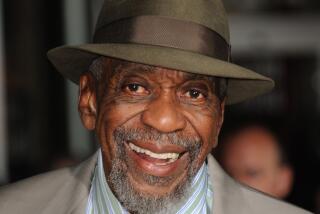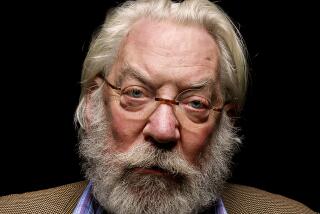Farley Granger dies at 85; handsome leading man best known for roles in Hitchcock films
Farley Granger, a handsome young leading man during Hollywood’s post-World War II era who was best known for his starring roles in the Alfred Hitchcock suspense thrillers “Strangers on a Train” and “Rope,” has died. He was 85.
Granger died of natural causes Sunday at his home in Manhattan, said a spokeswoman for the New York City medical examiner’s office.
In a career that began as a teenager when he was discovered in a local play by a casting director for producer Samuel Goldwyn, Granger made his film debut as a Russian youth in the 1943 film “The North Star.”
He went on to star in movies such as Nicholas Ray’s 1949 noir masterpiece “They Live by Night,” Anthony Mann’s 1950 crime drama “Side Street” and Luchino Visconti’s 1954 historical epic “Senso.”
“Slim and handsome, he possessed a sensitivity that could suggest a dark side to his characters as well as their vulnerability,” film reviewer Kevin Thomas, then a Times staff writer, wrote in 2003.
In the 1948 film “Rope” with James Stewart, Granger and John Dall play two young friends who commit a murder and hide the body in their apartment. Hitchcock famously shot the film in uninterrupted 10-minute takes.
In Hitchcock’s 1951 classic “Strangers on a Train,” Granger plays a tennis champion whose chance meeting with a suave psychopath on a train later threatens to destroy not only his career but his life.
“He played sensitive, romantic and sometimes doomed heroes,” Thomas said Tuesday, noting that Granger “had a natural elegance and grace.”
“He was very popular back in the day; he was sort of a heartthrob. The studios’ publicity machines were still going full force, and he was all over the movie magazines in the late ‘40s and early ‘50s.”
Granger recounted his days as a leading man in his 2007 memoir “Include Me Out: My Life From Goldwyn to Broadway,” which included the revelation that he was bisexual. He wrote the book with Robert Calhoun, his partner since the early 1960s.
In the book, Granger candidly discussed his romances, flings and affairs with men and women, including actresses Ava Gardner, Barbara Stanwyck and Shelley Winters, as well as composer Leonard Bernstein and playwright Arthur Laurents (who wrote the screenplay for “Rope”).
“I had never hidden anything, and nobody asked me any questions,” Granger told the Associated Press in 2007. “My only outing came eight or 10 years ago when I was an old man. Arthur Laurents gave an interview in which he outed me publicly.”
The son of a successful car dealership owner, Granger was born in San Jose on July 1, 1925. After the 1929 stock market crash, the newly poor family moved to Los Angeles, where Granger was discovered at 17 and signed a $100-a-week contract with the Goldwyn studio.
After appearing in his second film, the 1944 World War II drama “The Purple Heart,” Granger enlisted in the Navy and spent most of his wartime service in Hawaii.
Several years after resuming his film career, Granger became unhappy with some of the “junk” films he was required to appear in on loan from Goldwyn, who would suspend him without pay for refusing roles.
In 1953, Granger bought out his contract with Goldwyn and left Hollywood to study acting and try his hand at stage work in New York.
“It cost me every penny I had,” he wrote in his book, but “I was following my heart and doing what I had to do.”
In addition to starring in movies such as “The Girl in the Red Velvet Swing” and “The Naked Street,” Granger spent most of the 1950s appearing frequently on live TV anthology series such as “Playhouse 90” and “The United States Steel Hour.”
He later made occasional guest appearances on TV series such as “Matt Helm” and “The Love Boat” and appeared on soap operas including “The Edge of Night” and “One Life to Live.”
Despite a number of Broadway credits, tours with the National Repertory Theatre and a 1986 Obie Award for his performance in the off-Broadway play “Talley & Son,” Granger told the New York Times in 2007 that his years on stage never measured up to his hopes.
Looking back on his career in a 2007 interview with the Star-Ledger of New Jersey, Granger said: “It was just luck. And stubbornness. I wasn’t going to listen to anyone saying you can’t do this, you can’t do that. I didn’t care about that. I was just going to go my own way. I was just determined to live my own life.”
Calhoun, Granger’s longtime partner, who was an executive producer on “As the World Turns” and “Guiding Light,” died in 2008.
More to Read
Start your day right
Sign up for Essential California for the L.A. Times biggest news, features and recommendations in your inbox six days a week.
You may occasionally receive promotional content from the Los Angeles Times.






